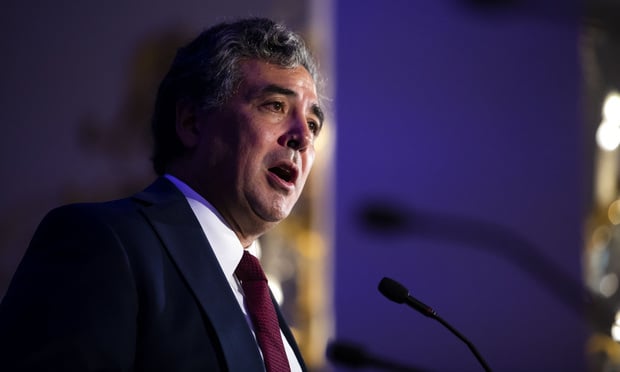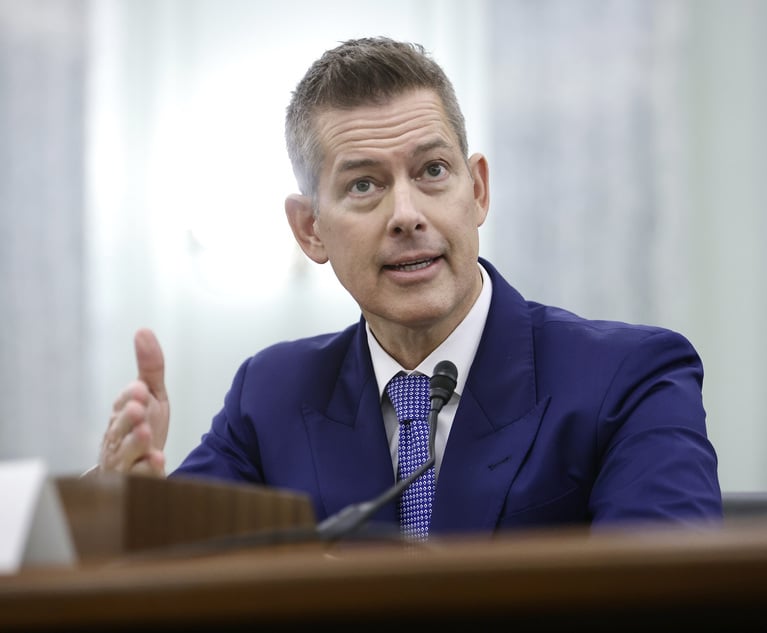Trump's DOJ Supports Overturning Key 2016 Abortion Rights Case at Supreme Court
The U.S. government's friend-of-the-court brief was among more than 35 filed this week in support of a Louisiana regulation that critics contend would pose an "undue burden" on women seeking an abortion.
January 03, 2020 at 01:01 PM
5 minute read
 U.S. Solicitor General Noel Francisco. Photo: Diego M. Radzinschi/NLJ
U.S. Solicitor General Noel Francisco. Photo: Diego M. Radzinschi/NLJ
The Trump administration's Justice Department on Thursday said the U.S. Supreme Court should consider narrowing or overturning a divided 2016 abortion-rights ruling that struck down two Texas clinic regulations the justices determined would pose an "undue burden" to women seeking abortions.
The ruling in Whole Woman's Health v. Hellerstedt is central to a Louisiana case the Supreme Court will hear in March concerning a regulation, mirroring the Texas provision, that would require doctors performing abortions to have admitting privileges at a hospital within 30 miles. Abortions rights supporters contend the Whole Woman's Health decision should be controlling and void the Louisiana law. Anti-abortion advocates argue the Louisiana case is distinguishable.
The U.S. government's new friend-of-the-court brief was among more than 35 filed Thursday by conservative-leaning groups backing Louisiana in the case June Medical Services v. Gee. Thirty-nine Republican U.S. Senators said the justices should consider overturning two seminal abortion decisions, Roe v. Wade and Planned Parenthood v. Casey.
The justices heard in December from female lawyers and law students, legal scholars, medical professionals and others who urged the court not to restrict access to reproductive health services. The court last year, with the vote of Chief Justice John Roberts Jr., blocked enforcement of the Louisiana law until the dispute is resolved, and a decision is expected by June.
"DOJ's brief desperately tries to distinguish Louisiana's law from a Texas law that also imposed admitting privileges requirements on abortion providers. They fail," Kristen Clarke, president and executive director of the National Lawyers' Committee for Civil Rights Under Law, said on Twitter. Clarke said "Louisiana's copy-cat law should be rejected now too."
The Justice Department's brief argued the challengers in the Louisiana case—an abortion clinic and two abortion providers—do not have legal "standing" to pursue claims on their own. The Supreme Court is preparing to take up that threshold issue, the resolution of which could carry broader consequences in abortion-related litigation.
Led by U.S. Solicitor General Noel Francisco, the Justice Department's brief, echoing Louisiana's argument, asserted "abortion providers have different and potentially conflicting interests" than the women who seek access to reproductive health services.
"Because the law creates compliance costs without any personal benefits for abortion providers, such providers have every incentive to see the law invalidated. For women, however, the calculus is different," Justice Department lawyers asserted in their new brief. "The law imposes no direct costs on them, and they may see its benefits as quite significant (while viewing any indirect costs as speculative)."
Francisco said the justices should consider scrapping the Whole Woman's Health ruling if the court finds it in conflict with Planned Parenthood v. Casey, the 1992 decision that affirmed Roe v. Wade's central holding and set the "undue burden" standard that is critical to judicial assessments of whether and how regulations interfere with a woman's access to abortion services.
"Stare-decisis [fidelity to precedent] considerations dictate that Hellerstedt should be narrowed or overruled to eliminate any conflict with Casey and the rest of this court's abortion precedents," Francisco wrote on DOJ's brief in the Louisiana case.
A group of constitutional law scholars in December told the justices in a friend-of-the-court brief: "Bedrock principles of stare decisis require continued adherence to this court's abortion rights precedents, which have been consistently applied, are eminently workable and legally and factually sound, and have induced extraordinary reliance," Gibson, Dunn & Crutcher's Orin Snyder wrote in the brief for the scholars.
 Former U.S. Solicitor General Donald Verrilli Jr. Photo: Diego M. Radzinschi/ ALM
Former U.S. Solicitor General Donald Verrilli Jr. Photo: Diego M. Radzinschi/ ALMFrancisco has asked the court to let the Justice Department argue in the Louisiana case, and the request is likely to be granted. Then-Solicitor Donald Verrilli Jr., now a partner at Munger, Tolles & Olson, argued in 2016 in support of Whole Woman's Health in the Texas case.
"The effects of the Texas law at issue in this case are much more extreme than those of any abortion law that this court has considered since Casey," Verrilli told the court. "This law closes most abortion facilities in the state, puts extreme stress on the few facilities that remain open, and exponentially increases the obstacles confronting women who seek abortions in the state."
The court ruled 5-3 in favor of Whole Woman's Health. The majority included then-Justice Anthony Kennedy, who has since retired. The March argument in the Louisiana case will be the first abortion dispute heard by Trump's two appointees to the court, Justices Neil Gorsuch and Brett Kavanaugh.
Read more:
39 Senate Republicans Ask SCOTUS to Reconsider 'Roe' Abortion Rights Ruling
'Compelled to Come Forward': Female Lawyers Urge Court to Back Abortion Rights
Justices Take Louisiana Abortion Case, Marking Major New Term
Women Lawyers' Group Stands Up for Liu After DOJ Nomination Scuttled
The Justices Had 5 Votes to Overturn 'Roe' in 1992. Why That Didn't Happen.
New O'Connor Book Chronicles Her Dementia Onset, Frustration With Alito
This content has been archived. It is available through our partners, LexisNexis® and Bloomberg Law.
To view this content, please continue to their sites.
Not a Lexis Subscriber?
Subscribe Now
Not a Bloomberg Law Subscriber?
Subscribe Now
NOT FOR REPRINT
© 2025 ALM Global, LLC, All Rights Reserved. Request academic re-use from www.copyright.com. All other uses, submit a request to [email protected]. For more information visit Asset & Logo Licensing.
You Might Like
View All
Apple Files Appeal to DC Circuit Aiming to Intervene in Google Search Monopoly Case
3 minute read

DOT Moves to Roll Back Emissions Rules, Eliminate DEI Programs

Law Firms Mentioned
Trending Stories
- 1Uber Files RICO Suit Against Plaintiff-Side Firms Alleging Fraudulent Injury Claims
- 2The Law Firm Disrupted: Scrutinizing the Elephant More Than the Mouse
- 3Inherent Diminished Value Damages Unavailable to 3rd-Party Claimants, Court Says
- 4Pa. Defense Firm Sued by Client Over Ex-Eagles Player's $43.5M Med Mal Win
- 5Losses Mount at Morris Manning, but Departing Ex-Chair Stays Bullish About His Old Firm's Future
Who Got The Work
J. Brugh Lower of Gibbons has entered an appearance for industrial equipment supplier Devco Corporation in a pending trademark infringement lawsuit. The suit, accusing the defendant of selling knock-off Graco products, was filed Dec. 18 in New Jersey District Court by Rivkin Radler on behalf of Graco Inc. and Graco Minnesota. The case, assigned to U.S. District Judge Zahid N. Quraishi, is 3:24-cv-11294, Graco Inc. et al v. Devco Corporation.
Who Got The Work
Rebecca Maller-Stein and Kent A. Yalowitz of Arnold & Porter Kaye Scholer have entered their appearances for Hanaco Venture Capital and its executives, Lior Prosor and David Frankel, in a pending securities lawsuit. The action, filed on Dec. 24 in New York Southern District Court by Zell, Aron & Co. on behalf of Goldeneye Advisors, accuses the defendants of negligently and fraudulently managing the plaintiff's $1 million investment. The case, assigned to U.S. District Judge Vernon S. Broderick, is 1:24-cv-09918, Goldeneye Advisors, LLC v. Hanaco Venture Capital, Ltd. et al.
Who Got The Work
Attorneys from A&O Shearman has stepped in as defense counsel for Toronto-Dominion Bank and other defendants in a pending securities class action. The suit, filed Dec. 11 in New York Southern District Court by Bleichmar Fonti & Auld, accuses the defendants of concealing the bank's 'pervasive' deficiencies in regards to its compliance with the Bank Secrecy Act and the quality of its anti-money laundering controls. The case, assigned to U.S. District Judge Arun Subramanian, is 1:24-cv-09445, Gonzalez v. The Toronto-Dominion Bank et al.
Who Got The Work
Crown Castle International, a Pennsylvania company providing shared communications infrastructure, has turned to Luke D. Wolf of Gordon Rees Scully Mansukhani to fend off a pending breach-of-contract lawsuit. The court action, filed Nov. 25 in Michigan Eastern District Court by Hooper Hathaway PC on behalf of The Town Residences LLC, accuses Crown Castle of failing to transfer approximately $30,000 in utility payments from T-Mobile in breach of a roof-top lease and assignment agreement. The case, assigned to U.S. District Judge Susan K. Declercq, is 2:24-cv-13131, The Town Residences LLC v. T-Mobile US, Inc. et al.
Who Got The Work
Wilfred P. Coronato and Daniel M. Schwartz of McCarter & English have stepped in as defense counsel to Electrolux Home Products Inc. in a pending product liability lawsuit. The court action, filed Nov. 26 in New York Eastern District Court by Poulos Lopiccolo PC and Nagel Rice LLP on behalf of David Stern, alleges that the defendant's refrigerators’ drawers and shelving repeatedly break and fall apart within months after purchase. The case, assigned to U.S. District Judge Joan M. Azrack, is 2:24-cv-08204, Stern v. Electrolux Home Products, Inc.
Featured Firms
Law Offices of Gary Martin Hays & Associates, P.C.
(470) 294-1674
Law Offices of Mark E. Salomone
(857) 444-6468
Smith & Hassler
(713) 739-1250








